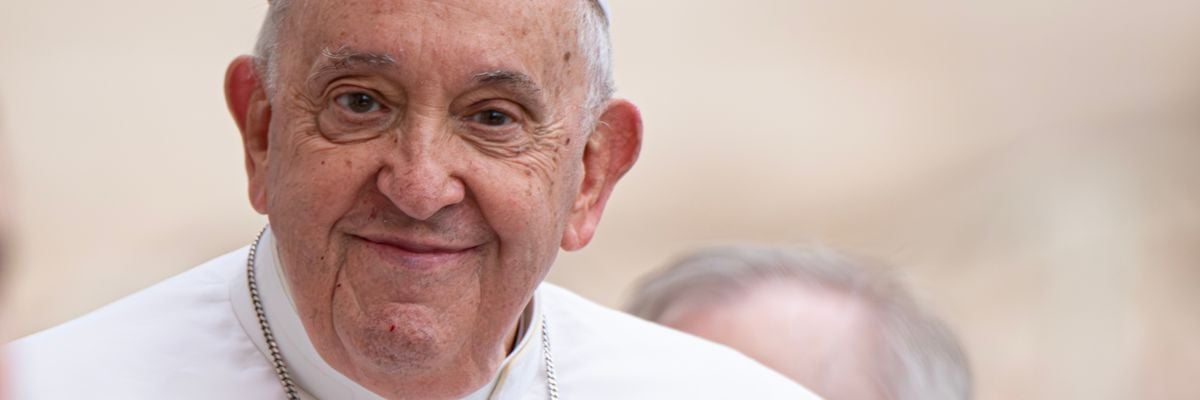
On this episode of Catholic Answers Live, Joe Heschmeyer joins Cy Kellett to answer a heartfelt question: Why should we pray for Pope Francis? Joe explains the spiritual responsibility Catholics have to pray for the Holy Father—especially during times of trial, confusion, and transition in the Church.
Transcript:
Cy: But we also are remembering the Pope and certainly praying for the Pope. Do pray for the Pope. Why do we pray for the dead? Joe, let me just give you, let you. Let’s have an apologist moment here. Someone might go, well, if he’s the Holy Father and he’s so close to Jesus, why would you pray for Pope Francis?
Joe: So there’s actually layers to that question, right? And I’ve seen people make that, you know, gotcha over and over again, like, oh, if he’s the Pope, why would you have to pray for him when he dies? And I actually, I genuinely worry about that. Like, if you’re a Protestant saying this, are you telling me you don’t pray for the people set in authority over you and your church and your denomination and your whatever, that you don’t pray for your pastor, you don’t pray for those who are shepherding? This is something that should be quite alarming to anyone who understands Christianity.
So, I mean, Hebrews 13:17 says, “Obey your leaders and submit to them, for they’re keeping watch over your souls as men who will have to give account.” So the fact that those in positions of authority are going to be, in accounting, is going to be demanded of them. That’s not a potshot towards Pope Francis or any church leader. That’s just a basic recognition of the biblical reality. You should hesitate to strive for a position of leadership because teachers will be judged more harshly. But this is also why we pray for kings and leaders and all those in authority, and that includes church authority.
Chris: Presidents of Catholic apostolates.
Cy: Yes, yes, we do. We pray for you all the time.
Joe: And so there’s, you know, a sort of, I think the best case scenario is a sort of spiritual naivety, as if the people leading don’t need prayers. I don’t. I mean, I would hope no parent thinks, oh, well, because God called me to lead, therefore I don’t need prayers. No, because you’ve been called to lead, you need prayers all the more. And so, whether alive or dead, I, you know, I try to make it a practice to pray for the Pope every day as well as for my local bishop. And I would encourage those listening to do the same and to pray during this time for a good and holy Pope who will serve God and the church.
Cy: Well, yeah, we don’t always get that. It’s possible.
Joe: We don’t always get that. Right. And that’s right. And so another reason we pray for anyone in leadership is because we don’t automatically get saints. And so, you know, we owe them obedience and they’re going to stand account. And nothing in Hebrews 13:17 says obey them because they’re all living saints. It doesn’t say that quite strikingly. If they’re all living saints, the bit about judgment is a bit redundant because, well, they’re all good to go. Don’t worry about it. That’s just not at all the biblical depiction.
So we pray for all those in authority, even, you know, presidents of Catholic apostolates, but even more so leaders of Catholic churches, to be able to stand before the just judge. Now that’s the first reason. The second is because we believe that prayer actually does something and because we believe in this process of spiritual purification that we call purgatory.
Now there’s a much deeper kind of dive we can do on that. But for now, maybe it’ll suffice just to point out that in Second Maccabees 15, you have Judas Maccabeus who leads the men in praying for their fallen brethren who’d fallen in battle. And then they make an offering for them, a sin offering. Now obviously we no longer need sin offerings because Jesus is a perfect sin offering. But we do need prayers, and that includes those who have died.
And so, you know, I’m sorry, I caught myself. I said Second Maccabees 15; I meant Second Maccabees 12. So apologies for that. So, you know, we pray for those who’ve fallen, and this includes bishops and priests and yes, popes who’ve died, that if there’s any purification that needs to happen for their souls so they can stand in the presence of God, be before whom nothing impure will ever stand, then we pray for them to enter the rest of God.
This is where, you know, “rest in peace” comes from this theology. And this is not just a 2000-year-old Catholic theology. Our Jewish older brothers and sisters pray for the dead. This is where the practice of sitting Shiva comes from. And there are prayers for the dead prayed for 11 months for family members. And, again, Second Maccabees 15, even for those Protestants listening, who you don’t have it in your Bible anymore? Well, first, it was there before. And second, even if you don’t think it’s inspired, at least recognize it’s historical that this speaks to the ancient Christian and Jewish practice of praying for those who have died.
So, like we are, I guess a way to put that is we’re not the weird ones here. The better question is if your theology of prayer doesn’t match the Jewish or the Catholic or the Orthodox or the Coptic theology of prayer. If every group that’s been around more than 500 years prays for those who’ve died and you don’t, I don’t think it’s us that need to explain ourselves to you. I think it’s kind of the other way around.
Cy: Yeah, okay.
Chris: No, it’s very good. Joe Heschmeyer really unleashing on the Protestants.
Cy: I know. Implying that they were weird. That’s what I heard him say. That’s what I heard. Now, you did a fine job, Joe. We’re just busting on you.
Joe: I mean, there’s a sense in which. Look, if you live in, say, the Southern United States, where all the Christians, you know, might be Protestant, you don’t realize how weird Protestantism is. And I think that’s a fine word for it, because we’re not saying evil, but it has very odd views on things that don’t seem odd to the people who grow up in it.
In the same way that, you know, I’ve talked to people who grew up in Utah, and they find it very strange that there are people who believe in Jesus Christ and aren’t Mormons, because everybody they know happens to be Mormon.
If they take the idea of Jesus seriously and pointing out, like, well, that’s not historically what Christianity looked like can be helpful. Again, not to demonize, but just to get people to maybe examine the presuppositions they have to say, okay, well, I believe this thing that it turns out not many people believed for most of church history. How well is that actually supported theologically?



